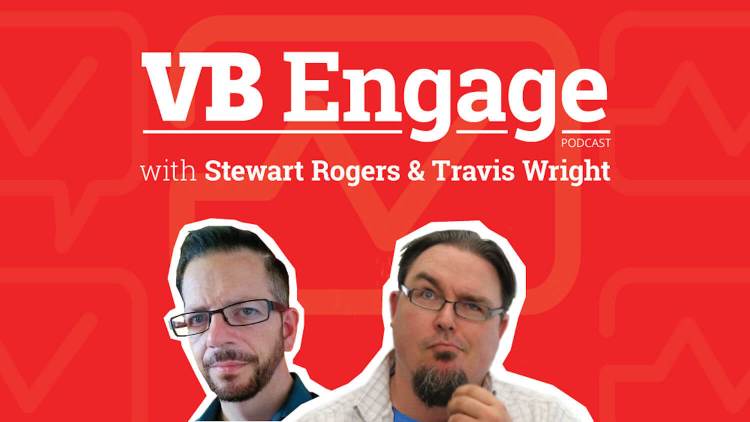This is the Michael Jordan of podcasts. Why? Because it is episode 23 of VB Engage, of course. And if you don’t get that reference, maybe you’d prefer it to be the David Beckham (Real Madrid era) of podcasts. Either way, in this episode we had a ball.
Stewart and Travis chat with David Steinberg, CEO of Zeta Interactive. And during the news segment of the show, we discuss Google, Facebook, and what the heck is going to happen when we start advertising and marketing in virtual reality.
If you missed last week’s VB Engage, we interviewed Marshall Kirkpatrick, the cofounder of Little Bird. That was a great interview, where we discussed how to surface industry experts on any topic and the wonders of engaging with communities.
Travis was in San Francisco this week, while Stewart was back in the 11th Century town of Tonbridge in the United Kingdom. Travis was in town to speak at Dreamforce with Scott Brinker and Capterra on a marketing technology panel, and he quickly found out what an injection of more than 100,000 extra people means to the SF public transport system.
The new Google Daydream is an exciting development in mobile VR. Why? Unlike Cardboard, it has a controller so that you can interact with the VR space around you. Oculus also had a VR event this week. The company talked about its prototype for a wireless product and revealed its new controllers. Stewart has been analyzing the VR space for a while now, so he digs into who he thinks will make the biggest impact.
Stewart and Travis talk about what the future of marketing within VR will look like. Travis gives some examples of what some companies have done in the past around VR, including looking at the failings of the current “commercial” format ads.
We talk about how product placements are an area where VR advertising makes sense. If you have a VR soda machine, you could skin it with a top brand, and after six months, when the deal runs out, reskin it with a new sponsor, or switch the machine out for a rice cooker.
You will also start seeing experiences within experiences in VR. This could be a side mission, which is its own contained, branded experience. What we hope is that we don’t get pop-ups, displays, and interstitials in VR — especially those that interrupt the experience and (almost literally) hit you in the face.
Finally, we discuss Salesforce’s acquisition of Krux, because that was the biggest news from the Dreamforce event, in Travis’ eyes.
Speaking of marketing technologies, this week’s guest is the brilliant CEO of Zeta Interactive.
We start off by talking about cross-device identity and connectivity. How can companies manage the connection of online to offline interactions? How can they think about cross-device attribution? In a world where Facebook and Google own all of these online properties, why is it so hard to do cross-device attribution?
David believes that cross-device attribution is one of the biggest challenges that everyone faces today. Google has the best attribution in the business. Someone clicks a Google Adwords ad and then buys. Easy to attribute. It gets more complicated if someone clicks an ad on the desktop, researches on their mobile phone, and then buys at some local store. It’s still a conversion, yet it’s much harder to track.
“We have what’s called ‘inferred attribution’. You need to build models where you focus on personally identifiable information (PII). At Zeta, it’s typically an email that people are using across devices,” Steinberg said.
David explains that if someone logs into their Facebook account on their iPad, iPhone, Android, and desktop, you can assume that it is the same person on each device. But to attribute offline sales, you can plug into the point-of-sale device at retail locations, and then feed that data back into the global database and match it through your DMP.
Once you figure out the personal identifier, you can begin to match more efficiently.
In other words, it is all about data. Data. Data. Data.
This podcast has a lot of wonderful information that the modern marketer needs to know.
As always, thanks for listening to VB Engage. Feel free to subscribe to VB Engage. Make sure to rate VB Engage 5+ stars. Or not.
Tune in next week for our interview with Mark Ghermezian, the founder and CEO of Appboy. We talk mobile CRM, mobile optimization, and mobile marketing automation. It’s pretty much the best podcast on mobile marketing ever. That is not hyperbole. Ok, maybe a little.



Thanks to our sponsor MailChimp for helping to make VB Engage possible.
VentureBeat's mission is to be a digital town square for technical decision-makers to gain knowledge about transformative enterprise technology and transact. Learn More

